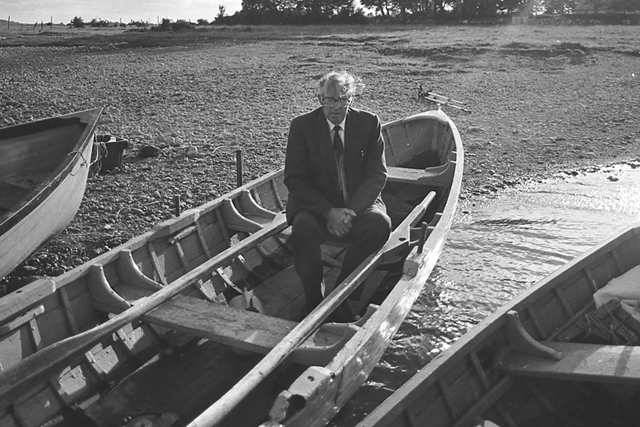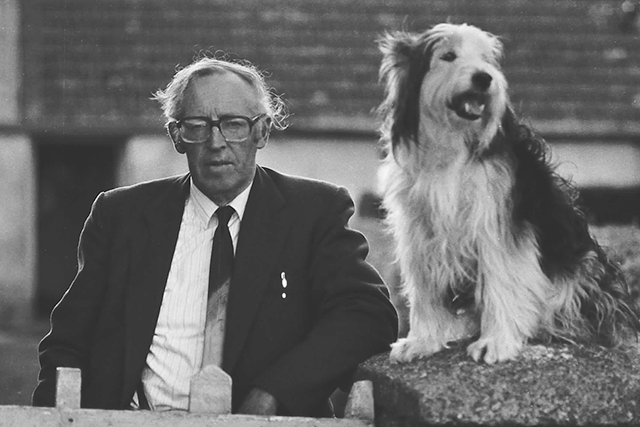Story and picture by Matt Nolan
John Connell from Inisbofin on Lough Ree died on 12 Feburary, 2018, after a short illness in Portiuncla Hospital, Ballinasloe. His funeral took place following Mass in the Church of the Immaculate Conception, Tubberclair, to the adjoining cemetery.
That’s what the official death notice states in relation to John Connell’s death and funeral arrangements. The story of John’s life and death is much wider and much greater than is evident from from the official death notice.
John was unique. He was the last person living on an inland island anywhere in Ireland… a fact he was proud of.
He was a traditional Lough Ree net fisherman operating under a licence that went back hundreds of years in his family and he was also an island farmer who lived close to his animals and to the wild birds that shared his island with him.
John Connell was born on 13th February, 1935, in one of the remotest locations in Ireland… Inisbofin island on the eastern side of Lough Ree. The name Inisbofin has an Irish meaning, “The fair coloured cows island.” It was an island that John and his family shared with two other families, the Heffernans and Skellys until the 1950s, when these two families left for the Westmeath mainland.
John’s father took him and his brothers and sister to school every morning in a row boat. He went to school during the war years or “The Emergency” as it was in Ireland, and he loved his school days at Ballynacliffy National School where Miss Curley was the principal and sole teacher in the school there.
During his summer holidays John would stay with the Heffernans, his cousins on the other side of Inisbofin and it was there that he learned the craft of hanging draft nets and the art of telling stories about the fairies that lived near Lough Ree “fadó, fadó.” There are some, however, who would argue that he never needed to learn the art of story telling as he always seemed to have it naturally.
John left school when he was 13 and went to work with his father and younger brother Brian, chasing big trout with draft nets and setting long lines for eels. It was a craft he excelled at. He got to know and understand everything about Lough Ree and the great fish that lived there and he made a good living fishing for trout and ells… The Lough Ree fish catch was then transferred to Athlone for dispatch by train to Billingsgate Fish Market in London on a daily basis.
The “Great Snow” of 1947 caused havoc on the Lough Ree islands with most of the island cut off from the mainland for weeks. It seemed that the islanders had enough and during the 1950s most of them moved to the mainland. The added attraction of rural electricity on the mainland added to the island’s decline.
John Connell stayed, even though all his island neighbours had left. He lived with his brother Pat in their modest three room house with a “tilley lamp” as a light source and turf from Tubberclair bog as a fuel. They never had electricity, just a simple radio they kept on the dresser along with what seemed a thousand other items. The radio kept them in touch with the world outside of Lough Ree.

Unfortunately John’s brother Pat died in 1990 leaving John alone on Inisbofin. He insisted on staying on Inisbofin and in fact his house became a sort of light house come tourist office, for travellers on Lough Ree. Everyone was welcomed, old neighbours and school friends, fishing friends of old and strays from afar who might get lost while cruising on the Shannon. Sometimes he might have difficulty understanding a particular German dialect but it never phased him, he simply put down his huge cast iron kettle on his open fire and got to work on his best sign language.
He never left his island home, not even for one night, until a few years ago when he was forced to spend a few days in hospital for tests. He was worried, as he felt the end was near, but not so, and he bounced back to Inisbofin in great spirits after a few nights away, remarking as he caught sight of his old homestead “I thought I would never see you again.”
John continued to live out the remainder of his days on Lough Ree, receiving old friends in his famous Inisbofin home and doing the odd bit of fishing. He was the sort of man, that everyone thought would go on forever, but such was not to be, and in late January he was forced to say goodbye to his beloved Inisbofin and enter Portiuncla Hospital in Ballinasloe. Then on his birthday, 12 February, with his family around him, he quietly uttered “slán” to them all and suddenly he was gone. Word of his death was flashed around the Lough Ree islands and his friends from across the midlands of Ireland turned out to bury “their King” with full military honours.
His funeral Mass and burial were like the man himself… simple and traditional and in an ironic turn of fate he was buried on the opening day of the draft net fishing on Lough Ree, a day that was always sacred to John.
Fr Seamus Mulvaney, the parish priest of Tubberclair recalled the “man on the island” of Inisbofin who came to Mass by boat every Sunday, regardless of weather, and who always referred to County Westmeath as “The Mainland.”
Fr Mulvaney explained how in The Year of The Millennium (2000) John invited everyone in the Parish of Tubberclair to a special Mass at the ruined church on Inisbofin. It was a great day and an occasion that John and Fr Mulvany wanted to make into an annual event, but it seems that some “plucky” insurance agent lost the head when he heard of the “goings on” at Inisbofin during the millennium and refused insurance cover thereafter.
His coffin was carried shoulder high by old and young fishermen from the main altar in Tubberclair Church as Danny Sheerin sang the fisherman’s song “Fiddlers Green.”
As I went by the dockside one evening so fair
To view the still water and take the salt air
I heard an old fisherman singing this song.
‘Won’t you take me away boys my time is not long.’
CHORUS
‘Wrap me up in me oilskin and jumper
No more on the docks I’ll be seen,
Just tell me auld shipmates,
I’m taking a trip, mates
And I’ll see you one day in Fiddler’s Green.”
“Now Fiddler’s Green is a place I’ve heard tell
Where fishermen go when they don’t go to hell,
Where the skies are all clear and the dolphins do play
And the cold coast of Greenland is far, far away.”
“Where there’s always a breeze and there’s never a gale
And the fish jump on board with a swish in their tail,
and you lie at your leisure, there’s nothing to do
And the captain’s below making tea for the crew.”
“When you get to the dock and the long trip is through
There’s pubs and there’s clubs, and there’s lassies there too,
and the girls are all pretty and the beer it is free
And there’s bottles of rum growing from every tree.”
“I don’t need a harp or a halo, not me,
Just give me a breeze and a stiff rolling sea,
And I’ll play me auld squeeze box as we roll along,
When the wind in the rigging will sing me this song.”
Chorus
After Mass, John was laid to rest under a great cypress tree in Tubberclair cemetery. He was the last of the Lough Ree island residents.
Ní bheidh a leithéid ann arís.

